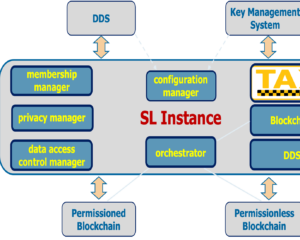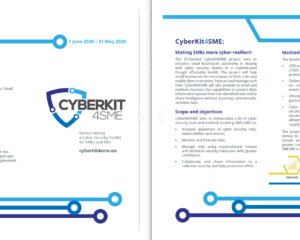Democratizing a Cyber Security Toolkit for SMEs & MEs
Helping SMEs and MEs analyse, forecast and manage cyber security and data protection risks.
Making SMEs & MEs more cyber-resilient
The project will use its tools and cyber range demos to train SMEs/MEs to identify their top threats and recognize and address them with greater confidence. Results will be validated by SME/ME in four critical sectors.
Latest News
In the CyberKit4SME project, we are using Blockchain technology for the Cyber Threat Intelligence sharing platform. Chosen Blockchain Technology We are using Service Ledger (SL) that is a blockchain-as-a-service platform offering programmable blockchain-enabled services that can be adapted to several application scenarios. In the CyberKit4SME project, SL enables the sharing of Cyber Threat Intelligence […]
To learn more about the @cyberkit4sme project, check out our new brochure. Scope, objectives, motivations, and impact, are all there. Please do not hesitate to contact us for further information or to collaborate: cyberkit@cyberkit4sme.eu Our goal is to provide cyber security tools that help SMEs and MEs become aware of, analyze, forecast, and manage cyber […]
We’re all increasingly aware that criminals are exploiting the virtual environment in a variety of ways, sometimes tricking individuals to reveal sensitive information or holding their data literally to ransom. So, we’re all encouraged to go online with caution, to update software regularly, install virus scanners and firewalls, and to be suspicious of unsolicited items […]
Latest Publications
Abstract: We are currently seeing an increase in the use of voice assistants which are used for various purposes. These assistants have a wide range of inbuilt functionalities with the possibility of installing third-party applications. In this work, we will focus on analyzing and identifying vulnerabilities that are introduced by these third-party applications. In particular, we will build third-party applications (called Skills) for Alexa, the voice assistant developed by Amazon. We will analyze existing exploits, identify accessible data and propose an adversarial framework that deceives users into disclosing private information. For this purpose, we developed four different malicious Skills that harvest different pieces of private information from users. We perform a usability analysis on the Skills and feasibility analysis on the publishing pipeline for one of the Skills.
Abstract: Small and medium enterprises (SMEs) make up a significant part of European economies. They are often described as poorly place to deal with cyber risks though because of resource constraints or commercial interests. Providing appropriate tooling would facilitate a greater appreciation of the risks and provide mitigation strategies. In a series of workshops demonstrating visualization tools for cybersecurity, constructs from healthcare models such as awareness, self-efficacy, and a willingness to engage were investigated to throw light on the likelihood that the technologies would be adopted. Although most constructs were validated, it turns out that self-efficacy could more appropriately be interpreted as a desire to understand a broader company narrative rather than empowering any individual to identify and manage cyber risk. As part of an ongoing examination of technology acceptance, this work provides further evidence that technology must be contextualized to make sense for the individual as part of the SME rather than as individual employee.
Abstract: Forest roads in Romania are unique natural wildlife sites used for recreation by countless tourists. In order to protect and maintain these roads, we propose RovisLab AMTU (Autonomous Mobile Test Unit), which is a robotic system designed to autonomously navigate off-road terrain and inspect if any deforestation or damage occurred along tracked route. AMTU's core component is its embedded vision module, optimized for real-time environment perception. For achieving a high computation speed, we use a learning system to train a multi-task Deep Neural Network (DNN) for scene and instance segmentation of objects, while the keypoints required for simultaneous localization and mapping are calculated using a handcrafted FAST feature detector and the Lucas-Kanade tracking algorithm. Both the DNN and the handcrafted backbone are run in parallel on the GPU of an NVIDIA AGX Xavier board. We show experimental results on the test track of our research facility.





